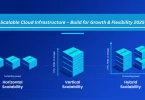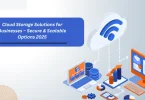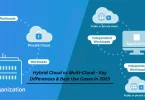Introduction
When it comes to cloud computing, three big names stand out — Amazon Web Services (AWS), Microsoft Azure, and Google Cloud Platform (GCP). Each offers powerful features, but choosing the right one depends on your specific needs. In this blog, we’ll dive into AWS vs Azure vs Google Cloud – Key Differences & Comparison 2025 to help you understand how they stack up in terms of performance, pricing, features, and more. Whether you’re a small business, a developer, or a large enterprise, this guide will make it easier to choose the best cloud platform for your goals in 2025.
What is AWS vs Azure vs Google Cloud?

AWS, Azure, and Google Cloud are the top three cloud computing platforms in the world. They provide businesses with on-demand services like storage, servers, databases, networking, artificial intelligence, and more—without needing physical hardware.
- Amazon Web Services (AWS): Launched by Amazon in 2006, AWS is the most widely used cloud platform. It offers the largest number of services and has the broadest global infrastructure.
- Microsoft Azure: Introduced in 2010, Azure is Microsoft’s cloud platform. It’s ideal for businesses that already use Microsoft tools like Windows Server, Office 365, or Active Directory.
- Google Cloud Platform (GCP): Launched by Google in 2008, GCP is known for its strengths in data analytics, machine learning, and scalable web applications.
Comparing AWS vs Azure vs Google Cloud helps businesses understand which platform fits best based on pricing, performance, support, and specific business needs.
You may also like it:
Cloud Compliance Requirements – Ensure Secure & Lawful Cloud Operations
Securing Multi-Cloud Environments – Strategies for Safer & Smarter Cloud Protection
Top Cloud Security Tools 2025 – Protect Your Data with Trusted & Powerful Solutions
Why Understanding AWS vs Azure vs Google Cloud Is Important
Choosing the right cloud provider is more than just picking a name—it directly impacts performance, cost, and future growth. Here’s why this comparison matters:
Helps You Choose the Right Platform for Your Needs
- Business Fit: Each platform is built with different strengths. Understanding them helps you choose one that matches your specific industry or goals.
- Service Offerings: AWS, Azure, and GCP offer different tools and features. Knowing what each provides avoids paying for services you don’t need.
- Ease of Integration: Some platforms integrate better with existing tools (e.g., Azure with Microsoft products). This can make setup and daily operations smoother.
Impacts Cost Management and Budget Planning
- Pricing Models Vary: Each cloud provider charges differently (hourly, per-minute, reserved). Choosing the wrong one could increase your costs.
- Hidden Costs: Without understanding pricing structures, you might face surprise bills for storage, bandwidth, or support.
- Right Sizing: Comparing services helps you avoid overprovisioning and pay only for what you use—saving money long-term.
Influences Performance and Scalability
- Data Center Locations: Cloud providers have different regional coverage. A closer data center can mean faster performance.
- Auto-Scaling Features: Some platforms offer better tools for scaling your resources automatically as demand grows.
- Downtime and Reliability: Comparing service-level agreements (SLAs) helps ensure your app or service stays online consistently.
Supports Better Security and Compliance Decisions
- Different Compliance Standards: Each provider supports different regulations (e.g., HIPAA, GDPR). This affects industries like finance and healthcare.
- Built-in Security Tools: Some platforms offer more advanced threat detection and identity management options.
- Shared Responsibility Models: Understanding what part of security is your job vs. the cloud provider’s helps prevent breaches.
Future-Proofs Your Business or Project
- Innovation Speed: Some platforms (like GCP) are faster in rolling out AI and ML tools, which could give you a competitive edge.
- Ecosystem Growth: The provider you choose today will affect your ability to adopt new tech or services tomorrow.
- Vendor Lock-In Risk: Knowing your options helps you avoid getting stuck with a single provider that may not meet your future needs.
Step-by-Step Guide: AWS vs Azure vs Google Cloud

Use this step-by-step approach to evaluate the three major cloud providers and decide which one best fits your needs in 2025.
Step 1: Define Your Business Needs
- Understand Your Goals: Are you building a website, deploying AI models, storing data, or running enterprise applications?
- Consider Your Industry: Healthcare, finance, and education have different compliance and security needs.
- Determine Your Scale: Are you a startup, SME, or large enterprise? Your size affects your cloud usage and budget.
Step 2: Compare Core Services
- Compute Services: Look at EC2 (AWS), Azure VMs, and GCP Compute Engine for scalability and flexibility.
- Storage Options: Compare S3 (AWS), Blob Storage (Azure), and Cloud Storage (GCP) for capacity, pricing, and reliability.
- Databases and Networking: Each offers managed databases (like RDS, Azure SQL, Cloud SQL) and global networking tools.
Step 3: Evaluate Pricing Models
- Free Tiers: Explore the free offerings each provider gives for new users to test services risk-free.
- Billing Options: AWS and Azure offer pay-as-you-go, reserved, and spot pricing; GCP is great for sustained usage discounts.
- Use Pricing Calculators: Use official pricing tools to estimate monthly costs based on your workload and usage.
Step 4: Check Performance & Global Availability
- Data Center Locations: Choose a provider with data centers near your target audience or region.
- Latency and Speed: Test speed performance, especially if you run real-time or high-traffic applications.
- Service Reliability: Review uptime SLAs and historical outage records for each provider.
Step 5: Assess Security & Compliance
- Security Features: Look into encryption, IAM (Identity & Access Management), and firewall tools.
- Compliance Support: Ensure the provider meets necessary standards like GDPR, HIPAA, SOC 2, etc.
- Shared Responsibility: Understand what security tasks are handled by the provider vs. what you must manage.
Step 6: Analyze Integration & Ecosystem
- Existing Tools Compatibility: Azure integrates best with Microsoft tools, while AWS supports a wide range of third-party apps.
- Marketplace & Add-ons: Check availability of prebuilt apps, APIs, and developer tools.
- Hybrid & Multi-cloud Support: Azure and GCP offer strong hybrid solutions if you plan to mix on-premises and cloud environments.
Step 7: Consider AI, ML, and Analytics Capabilities
- Machine Learning Tools: AWS (SageMaker), Azure (Machine Learning Studio), and GCP (Vertex AI) all offer powerful ML platforms.
- Big Data Support: GCP leads in big data (BigQuery), while AWS and Azure also offer strong alternatives.
- Custom Models & APIs: Evaluate how easily each platform allows building, training, and deploying your own models.
Step 8: Review Support & Documentation
- Technical Support Plans: AWS and Azure offer tiered support plans; GCP includes some basic support in its pricing.
- Community & Forums: All three have strong communities and extensive learning materials.
- Training & Certification: Consider cloud certifications if you want to grow skills or train your team.
Step 9: Try Before You Buy
- Set Up a Free Account: All three providers offer free tiers—create sample projects and test tools yourself.
- Pilot Project: Run a small project to compare user experience, speed, and management dashboards.
- Compare Admin Consoles: Each platform has a different interface; see which one feels easiest to manage.
Advantages and Disadvantages of Comparing AWS vs Azure vs Google Cloud
| Advantages | Disadvantages |
| Informed Decision Making It helps businesses choose the right cloud platform based on features, pricing, and scalability needs. | Complexity in Evaluation With so many services, pricing models, and features, comparing them can become overwhelming and time-consuming. |
| Cost Optimization By understanding pricing models and free tiers, you can avoid overspending and select the most cost-effective solution. | Information Overload The constant updates and evolving service lists can confuse users who are trying to make long-term decisions. |
| Performance Matching You can evaluate which provider offers the best performance for your location, application type, or workload. | No One-Size-Fits-All Each platform has strengths in different areas, making it hard to declare one as the “best” for every use case. |
| Better Integration Comparing platforms ensures you select the one that integrates smoothly with your existing tools and systems. | Hidden Costs Even after comparison, hidden fees like data transfer, support plans, or API calls may surprise users later. |
| Security and Compliance Alignment Each provider supports different regulations and security tools, allowing you to choose one that fits your industry standards. | Risk of Vendor Lock-In Choosing one provider without considering future flexibility may lock you into their ecosystem, making it difficult to switch later. |
You may also like it:
Cloud Security Best Practices 2025 – Protect Your Data with Smarter & Safer Strategies
Real-Time Data Processing with AI – Faster Insights & Smarter Decisions
Top Benefits of AI Cloud Integration – Smarter Faster & Scalable Business Solutions
Frequently Asked Questions (FAQs)
Q1: What is the main difference between AWS, Azure, and Google Cloud?
A: AWS is known for its large service range and global reach. Azure works well with Microsoft tools. Google Cloud is strong in AI and big data.
Q2: Which cloud platform is best for beginners?
A: Google Cloud has a simple interface and great documentation, making it beginner-friendly. Azure is easy if you already use Microsoft services.
Q3: Which one is cheaper – AWS, Azure, or Google Cloud?
A: Google Cloud is often cheaper for long-running tasks. AWS and Azure offer discounts for reserved or spot instances. It depends on your usage.
Q4: Can I use more than one cloud provider?
A: Yes! Many companies use a multi-cloud setup to avoid downtime, improve flexibility, and reduce costs.
Q5: Which one is best for data security?
A: All three offer strong security tools. The key is how well you configure your cloud setup and follow best practices.
Q6: What if I already use Microsoft products?
A: If you use things like Office 365, Windows Server, or Active Directory, Azure is usually the easiest to integrate.
Q7: Do they all offer free trials?
A: Yes! All three providers offer free tiers or trial credits so you can test services before paying.
Q8: Which cloud is best for AI and machine learning?
A: Google Cloud leads in AI and ML tools. AWS and Azure also offer solid options, but GCP is often the top choice for data science work.
Conclusion
Choosing between AWS, Azure, and Google Cloud depends on your business needs, budget, and tech goals. AWS is great for scale and service variety, Azure works best with Microsoft tools, and Google Cloud shines in AI and data analytics. By understanding their key differences, you can make a smarter choice that fits your project and helps your business grow in 2025.
Bonus Points
- Free Learning Resources
All three platforms offer free training, tutorials, and certification paths—great for beginners and professionals looking to grow their skills. - Certifications for Career Growth
Earning certifications like AWS Solutions Architect, Microsoft Certified: Azure Administrator, or Google Cloud Engineer can boost your resume and job opportunities. - Strong Community Support
Each provider has active communities, forums, and user groups where you can ask questions, find solutions, and learn from real-world use cases. - Marketplace Options
You can access ready-to-deploy apps and services via AWS Marketplace, Azure Marketplace, and Google Cloud Marketplace to save development time. - Multi-Cloud is Growing
More companies are using a mix of providers to get the best of each—flexibility, cost savings, and improved reliability.
You may also like it:
AI-Driven Cloud Analytics – Smarter Data Insights for Modern Businesses
Intelligent Cloud Platforms – Smart Scalable & Secure Computing Solutions
Top Cloud-Based Machine Learning Tools in 2025 – Features Benefits & Use Cases
AI in Cloud Computing 2025 – Latest Trends Innovations & Future Insights





